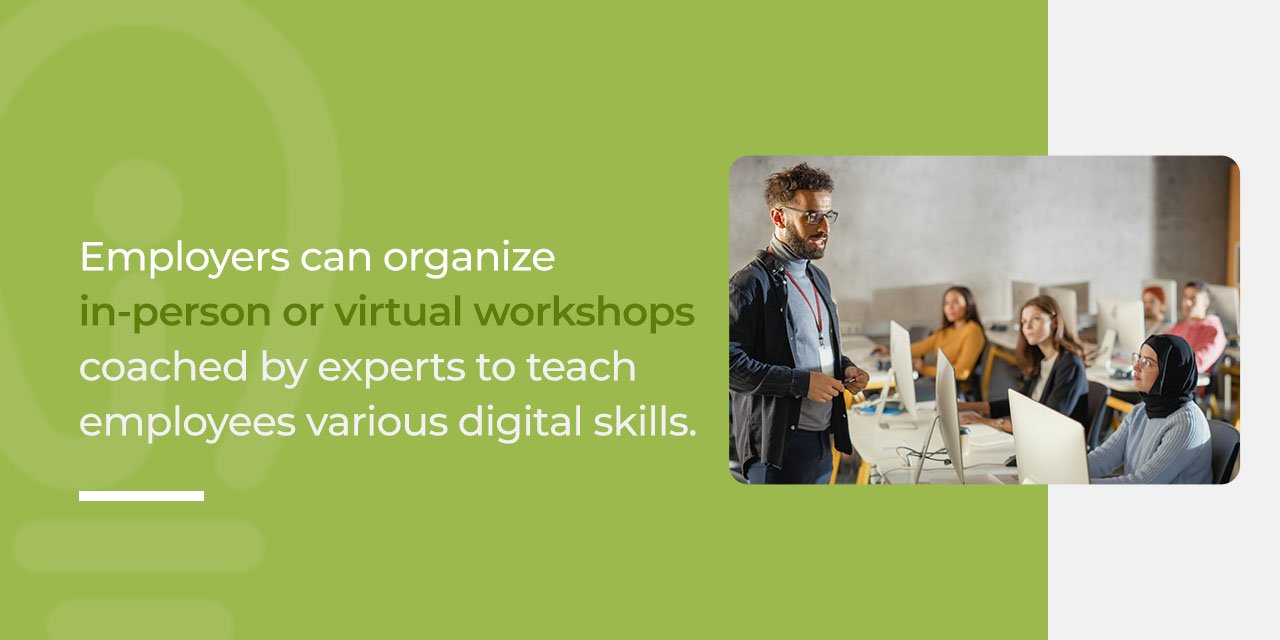Digital Skills Development
Table of Contents
Employees must have basic digital skills in today's modern workplace — it's almost non-negotiable. Depending on the industry and company needs, some employees must build their digital skills to a more advanced level.
But what are digital skills exactly? What counts as basic or advanced skills? How can you, as an employer, help your employees with digital skills development?
What Are Digital Skills?
Digital skills include various technological abilities and knowledge necessary to complete work activities. These skills involve using digital devices, hardware, software, applications, and networks. Digital skills and tools allow one to create, communicate, and collaborate.
Digital skills is an umbrella term. It can cover anything from data and IT to communication and problem-solving. Their complexity can also range from basic to advanced. Regardless of their purpose and complexity, digital skills are sought after in various industries.
Its popularity is all thanks to the rise in technology use. But, as technology usage grows, so does the digital skills gap. In fact, one-third of the U.S. lacks the basic digital skills required in this modern economy. This gap widened even more during the global COVID-19 pandemic.
This digital skills gap must be addressed to help employers and employees grow. Organizations can help close the digital skills gap with employee learning. But before we dig into how you can help, let's first understand how you can benefit from digitally skilled employees.
Why Are Digital Skills Important for Work?
As an employer, you understand the importance of technology in the workplace. But what does having a workforce well-versed in digital technologies bring to the table? How do digital skills help your staff?
Benefits for Employers
Organizations with a digitally-versed workforce can experience numerous benefits, such as:
Increased efficiency: Digital skills help streamline processes, automate tasks, and reduce manual errors. As a result, companies can experience higher productivity and cost-effectiveness.
Access to global talent: Having digitally skilled employees allows employers to tap into a wider talent pool — irrespective of geographic constraints. This way, organizations can foster diversity and innovation.
Competitive advantage: Companies with digitally-skilled employees can adapt faster to market changes. Their workforce can implement new technologies more swiftly and, thus, stay ahead of competitors.
Data utilization: Company leaders can make informed decisions and create strategic plans through effective data analysis and interpretation. All are contributing to the business's growth.
Enhanced security measures: Employees trained in digital security practices can mitigate cyber threats. Employers can thus safeguard sensitive company data and customer information.
Benefits for Employees
Of course, employees too will benefit from developing digital skills — be it for their current or future careers:
Career advancement: Digital skills open doors to new job opportunities, promotions, and career growth for employees.
Increased productivity: Mastery of digital tools and software helps employees work more efficiently and accomplish tasks faster and more accurately.
Flexibility and remote work: Proficiency in digital skills allows staff to work remotely. A great selling point is that it offers flexibility and work-life balance in today's evolving work landscape.
Skill diversification: Learning digital skills encourages continuous learning and skill diversification. As such, employees become more adaptable to changing job requirements.
10 Digital Skills Examples
To provide some context, we compiled a brief list of critical digital skills organizations can look into. The following skills are categorized according to their level — from basic to advanced.
4 Basic Digital Skills
The digital skills an employee should have will depend on the industry and the career. That said, employees should still strive to develop the following basic and essential skills:
Computer literacy: To help navigate digital interfaces, employees must have basic computer literacy. This skill can include office suites like Microsoft Office and Google Workspace. Other tools can include security software like McAfee and other utilities like Adobe Acrobat Reader.
Internet navigation: Employees must understand web browsers and search engines like Google Chrome and Safari. They can efficiently browse, search, and evaluate online information through this skill.
Email management: Digital communication skills are vital in various professional settings. Employees must be able to manage inboxes, compose professional emails, and follow email etiquette. Communication software can include Gmail and Outlook, in addition to messaging apps like Microsoft Teams and Slack.
Social media familiarity: It is valuable to understand social media platforms, their functionalities, and basic posting and sharing techniques. Employees with these skills can help companies expand their online presence and brand reach.
6 Advanced Digital Skills
Of course, some industries will demand more digitally advanced skills to achieve specific goals and tasks. These skills can include:
Data analysis: This includes the ability to collect, interpret, and derive insights from data using tools like Excel, Python, or Tableau. Data analysis is crucial for making informed decisions and strategies.
Coding and programming: Proficiency in programming languages like Python, JavaScript, or Java helps one develop software and websites and automate tasks. Even having a basic knowledge of computer coding languages is an in-demand skill.
Digital marketing: Companies today must have a digital presence, and having employees skilled in digital marketing can help them reach and engage with audiences. Digital marketing skills include search engine optimization (SEO), search engine marketing (SEM), social media advertising, and content marketing.
Cybersecurity awareness: Your employees are usually your first line of defense. Focusing on their cybersecurity skills can help protect data and systems from potential breaches. They should know different cybersecurity threats, best practices, and tools.
Cloud computing: Allow your organization to be scalable and provide a digital infrastructure with the help of employees skilled in cloud computing. This skill set includes understanding cloud platforms like Amazon Web Services (AWS), Azure, or Google Cloud for storage, computation, and deployment.
AI and machine learning (ML): Recently, AI and ML have been making waves. Organizations riding this wave will require employees to become familiar with these concepts and tools. Through this, they can help automate processes, predict patterns, and optimize decision-making.
How to Develop or Improve Digital Skills
Firstly, what is skill development? Skill development is obtaining or improving new abilities, knowledge, and expertise in specific areas. Employers can take matters into their own hands by implementing several skill development methods to enhance their employees' digital skills.
To help address specific digital skill gaps within your organization, implement the following strategies:
1. Training Workshops and Seminars
Employers can organize in-person or virtual workshops coached by experts to teach employees various digital skills. These sessions can cover data analysis, digital marketing, or cybersecurity to provide a hands-on learning experience.
2. On-the-Job Training and Mentoring
Encouraging a culture of mentorship within the organization allows experienced employees to guide and teach digital skills to their colleagues — while working on real projects. This method fosters a collaborative learning environment.
3. Access to Learning Resources and Subscriptions
Provide access to online courses, educational platforms, and subscriptions to digital skill-building resources. These platforms can equip employees with self-paced learning opportunities and diverse learning materials.
4. Job Rotation and Cross-Training
Encouraging employees to explore different roles or departments within the organization exposes them to varied digital tools and practices. This cross-training approach can broaden their skill set and understanding of digital technologies.
5. Online Training Programs
Employers can invest in specialized online training programs tailored to the organization's needs. Online programs offer flexibility, allowing employees to learn at their own pace and conveniently. These programs can cover topics ranging from basic computer literacy to advanced data analysis or coding skills.
Intellezy Can Help You Empower Your Team
To stay competitive, employers must help develop their employees' digital skills. To help with your organization's digital skills training, partner with Intellezy.
Intellezy offers personalized eLearning solutions tailored to your company's vision and goals, as well as a comprehensive library of online video courses focused on the most popular software and business skills. We are a leading eLearning content development company that walks you through each step of developing your custom eLearning and training videos.
Contact us online today if you're ready to improve employee engagement, bridge skills gaps, and boost morale.



